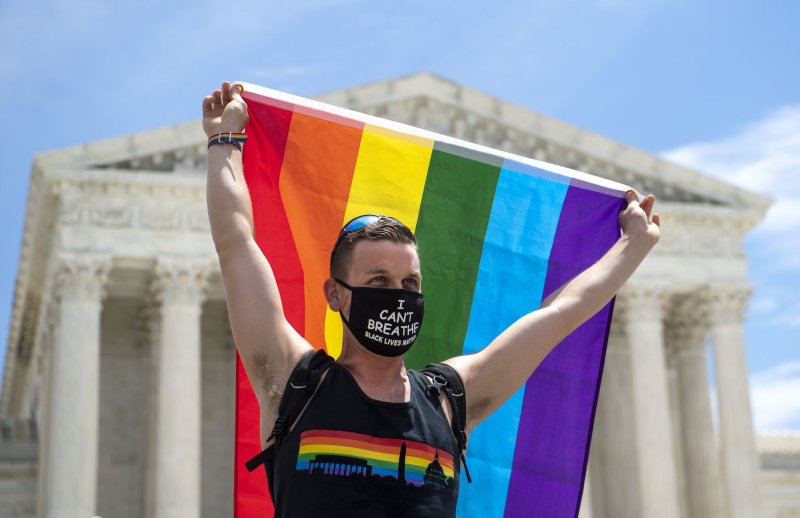Joseph Fons waves a rainbow flag Monday in front of the U.S. Supreme Court in Washington, D.C., after the high court released a decision that bans LGBTQ employment discrimination. The Supreme Court's 6 to 3 decision ruled that employment discrimination on the basis of sexual orientation or gender identity is illegal. Photo by Kevin Dietsch/UPI |
License Photo
June 15 (UPI) -- The U.S. Supreme Court ruled Monday that federal civil rights law protects lesbian, gay, bisexual and transgender workers from being fired based on their orientation.
The 6-3 vote is a significant victory for LGBT Americans and advocates. The ruling says Title VII of the Civil Rights Act of 1964 covers LGBT workers from employment discrimination.
Associate Justice Neil Gorsuch wrote for the majority, saying Title VII makes it illegal to discriminate based on a person's sex and the landmark law covers gay and transgender Americans.
The justices ruled that sexual orientation and transgender status applies in that description.
"An individual's homosexuality or transgender status is not relevant to employment decisions," Gorsuch wrote in the opinion for Bostock vs. Clayton County, Ga. "That's because it is impossible to discriminate against a person for being homosexual or transgender without discriminating against that individual based on sex.
"A statutory violation occurs if an employer intentionally relies in part on an individual employee's sex when deciding to discharge the employee," it adds. "Because discrimination on the basis of homosexuality or transgender status requires an employer to intentionally treat individual employees differently because of their sex, an employer who intentionally penalizes an employee for being homosexual or transgender also violates Title VII. There is no escaping the role intent plays."
The Trump administration had asked the high court to rule that Title VII does not cover LGBT Americans, and doing so was not the original intent of lawmakers.
Gorsuch joined Chief Justice John Roberts and associate justices Ruth Bader Ginsburg, Stephen Breyer, Sonia Sotomayor and Elena Kagan in voting for the majority. Justices Samuel Alito, Clarence Thomas and Brett Kavanaugh voted in dissent.
The ruling gives a measure of protection to LGBT communities in 29 states that don't have laws prohibiting job discrimination based on sexual orientation or gender identity.
The decision was based in part on cases involving Gerald Bostock, who was fired from a county job in Georgia after he joined a gay softball team, and relatives of Donald Zarda, a skydiving instructor who was fired after telling a female client not to worry about being strapped tightly to him during a jump because he was "100 percent gay."
In a separate case, the court ruled the law also covered Aimee Stephens, who was fired from a funeral home in Michigan after transitioning to a woman. She'd worked the first six years in the job as a man. Stephens died at the age of 59 last month due to complications from kidney disease.
The funeral home had said Stephens was fired over a dress code issue.
"They said they're firing her because she would be expressing herself as a woman in the workplace," John A. Knight, an attorney with the American Civil Liberties Union Foundation in Chicago, told UPI a year ago. "They discriminated against our client because she is transgender."
In his dissenting opinion, Alito accused the majority of legislating from the bench, saying it's Congress' responsibility to define the inclusion of sexual orientation and transgenders in the Civil Rights Act. He said a House bill to do that was passed in 2019 but has stalled in the Senate.
"Usurping the constitutional authority of the other branches, the court has essentially taken [the bill's] provision on employment discrimination and issued it under the guise of statutory interpretation," Alito wrote. "A more brazen abuse of our authority to interpret statutes is hard to recall."
In a separate dissent, Kavanaugh argued that the law should expressly cite sexual orientation and gender identity as protected classes.
"I have the greatest, and unyielding, respect for my colleagues and for their good faith. But when this court usurps the role of Congress, as it does today, the public understandably becomes confused about who the policymakers really are in our system of separated powers," Kavanaugh wrote.
"The best way for judges to demonstrate that we are deciding cases based on the ordinary meaning of the law is to walk the walk, even in the hard cases when we might prefer a different policy outcome."















